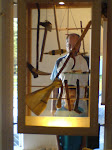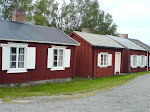måndag 2 juli 2007
More thoughts…
Came to think about defences yesterday when I had gone to bed… Something in the style that we can’t control those defences with our consciousness. Because of the nature of the unconscious. It’s an automatic reaction, to protect the grown up against truths he/she couldn’t experience consciously as a child… And I searched for this in Jean Jenson’s book and found a lot else when I read in it (rather skimmed it again).
And I have also thought of exploring the topic power and control, and needs connected to this (the needs for power and control and from where they come, to what extent a grown up actually needs this, what is actually grown up needs concerning this and what in fact re childhood needs more)…
Let’s see if come to those issues now or in blogposts later!?
I also came to think once again about what Kirkengen writes about violations of integrity in people, small and grown up. Violations of boundaries. Thus violation of people’s integrity. This (violations of integrity or boundaries) is a little different if it is about a child or a grown up (if it isn’t about a relation with a power differential, such as helper, caretaker towards a patient or client?). A grown up usually have options and many more choices than a small child. But here power comes in too, both for small people and grown ups… And circumstances…
A grown up can feel helplessness, consciously or unconsciously though and feel it very real or be unaware he/she reacts like this. But if he/she reacts like this it has a reason that hasn’t been processed and could be processed – I think and want to believe in. A feeling that he/she is unable to defend her/him against other grown ups. Yes, does Freyd’s power differential come in here?
Now I am thinking highly again…
And a grown up can feel helplessness even when he/she isn’t actually helpless. And these feelings stems from early in life, triggered in the present… And these feelings can be very real. And protect the grown up from seeing and realizing that this is actually about the past. The mind protecting the grown up against things that has already happened, things that were so painful so the child or young person then couldn’t experience the event consciously…
The problem is to see or understand what is what (and I truly believe this isn’t easy, even very difficult, but I want to believe it is possible though, perhaps with a lot of struggles though)?? When strong feelings and reactions are triggered. And in this state you are easily manipulated… When you are in that child state… See Freyd and about telling/narrating in for example a therapy-relation and not being abused afterwards OR during it…
Jenson also points out that violations aren’t just physical or sexual but also emotional and psychological. And she also writes that what is still made light/belittled and paid no attention/neglected is the extent to which all forms of violations and abuse hurts and damage a small child. And the long-term effects, if they haven’t been processed.
She also means that most of us have been violated in some way some time during our childhood, emotionally if not physically or sexually.
And sometimes it isn’t enough just to learn new, corrected behaviors, or often it is not enough to change things more radically… This can be a comfort to be aware of and know??
What I also wanted to come to is (as Miller writes in “Paths of Life”?) if one blames the client for failures because of old methods alleged infallibility one unavoidably lands in the same fairways as the guru’s which promises total liberation… And she includes regressive methods among those old methods!!!
So I want to question whose fault a failure actually is. Want to question if it is the clients automatically. Want to raise the question and even assertion that it can be the therapists fault as much!!!
It also stood in Jenson about unrealistic expectations on the child. My comment: far beyond its capacity right then and in that age!!?? And even higher than on a grown up sometimes!!?? And perfectionist demands on it: so where does perfectionism in a grown up come?
Unprocessed things from early has damaged our ability to process things later in life constructively… We put too much or too little in situations, events and circumstances… And are more or less incapable (depending on how hurt we are) to protect ourselves adequately against persons and things we should need to protect ourselves against and sometimes we protect ourselves against those we shouldn’t need to protect ourselves against? Which can be very tragic.
Freyd writes about a too great or too small willingness to trust, and both are tragic solutions to life (I really like what Freyd writes!!).
Jenson means that it is those which react too strongly which seek therapy, not the ones reacting too weakly or little (to simplify it a bit??).
And she also writes something in the style that “It wasn’t so long ago as suppression of all emotional suffering was admired, to ‘clench your teeth’ was seen as a sign for ‘self-restraint’ and ‘good upbringing’.” But so it is still; the ones that have their emotions under control, in check, are logical and not emotional are put higher and more trusted than the ones that express their feelings and emotions directly!!??
Jenson also writes that even if we as parents, as is already said, can’t give our children all they need in a perfect way it is still what our children need. This causes pain equivalent to the degree and extent they don’t get what they need. The more defective and/or imperfect the parents are the greater the pain and the risk the child feel as left out and without hope as a prisoner in war. This is the reason why small children can’t allow themselves to be aware of that they parents don’t measure up (possibly to the extent acknowledging that they are dangerous - though) without risk jeopardizing their security. To protect the child against this risk the psyche intervenes with the help of the unconscious so that these facts and their meaning become blocked. This blockage is called suppression.
And I have also thought of exploring the topic power and control, and needs connected to this (the needs for power and control and from where they come, to what extent a grown up actually needs this, what is actually grown up needs concerning this and what in fact re childhood needs more)…
Let’s see if come to those issues now or in blogposts later!?
I also came to think once again about what Kirkengen writes about violations of integrity in people, small and grown up. Violations of boundaries. Thus violation of people’s integrity. This (violations of integrity or boundaries) is a little different if it is about a child or a grown up (if it isn’t about a relation with a power differential, such as helper, caretaker towards a patient or client?). A grown up usually have options and many more choices than a small child. But here power comes in too, both for small people and grown ups… And circumstances…
A grown up can feel helplessness, consciously or unconsciously though and feel it very real or be unaware he/she reacts like this. But if he/she reacts like this it has a reason that hasn’t been processed and could be processed – I think and want to believe in. A feeling that he/she is unable to defend her/him against other grown ups. Yes, does Freyd’s power differential come in here?
Now I am thinking highly again…
And a grown up can feel helplessness even when he/she isn’t actually helpless. And these feelings stems from early in life, triggered in the present… And these feelings can be very real. And protect the grown up from seeing and realizing that this is actually about the past. The mind protecting the grown up against things that has already happened, things that were so painful so the child or young person then couldn’t experience the event consciously…
The problem is to see or understand what is what (and I truly believe this isn’t easy, even very difficult, but I want to believe it is possible though, perhaps with a lot of struggles though)?? When strong feelings and reactions are triggered. And in this state you are easily manipulated… When you are in that child state… See Freyd and about telling/narrating in for example a therapy-relation and not being abused afterwards OR during it…
Jenson also points out that violations aren’t just physical or sexual but also emotional and psychological. And she also writes that what is still made light/belittled and paid no attention/neglected is the extent to which all forms of violations and abuse hurts and damage a small child. And the long-term effects, if they haven’t been processed.
She also means that most of us have been violated in some way some time during our childhood, emotionally if not physically or sexually.
And sometimes it isn’t enough just to learn new, corrected behaviors, or often it is not enough to change things more radically… This can be a comfort to be aware of and know??
What I also wanted to come to is (as Miller writes in “Paths of Life”?) if one blames the client for failures because of old methods alleged infallibility one unavoidably lands in the same fairways as the guru’s which promises total liberation… And she includes regressive methods among those old methods!!!
So I want to question whose fault a failure actually is. Want to question if it is the clients automatically. Want to raise the question and even assertion that it can be the therapists fault as much!!!
It also stood in Jenson about unrealistic expectations on the child. My comment: far beyond its capacity right then and in that age!!?? And even higher than on a grown up sometimes!!?? And perfectionist demands on it: so where does perfectionism in a grown up come?
Unprocessed things from early has damaged our ability to process things later in life constructively… We put too much or too little in situations, events and circumstances… And are more or less incapable (depending on how hurt we are) to protect ourselves adequately against persons and things we should need to protect ourselves against and sometimes we protect ourselves against those we shouldn’t need to protect ourselves against? Which can be very tragic.
Freyd writes about a too great or too small willingness to trust, and both are tragic solutions to life (I really like what Freyd writes!!).
Jenson means that it is those which react too strongly which seek therapy, not the ones reacting too weakly or little (to simplify it a bit??).
And she also writes something in the style that “It wasn’t so long ago as suppression of all emotional suffering was admired, to ‘clench your teeth’ was seen as a sign for ‘self-restraint’ and ‘good upbringing’.” But so it is still; the ones that have their emotions under control, in check, are logical and not emotional are put higher and more trusted than the ones that express their feelings and emotions directly!!??
Jenson also writes that even if we as parents, as is already said, can’t give our children all they need in a perfect way it is still what our children need. This causes pain equivalent to the degree and extent they don’t get what they need. The more defective and/or imperfect the parents are the greater the pain and the risk the child feel as left out and without hope as a prisoner in war. This is the reason why small children can’t allow themselves to be aware of that they parents don’t measure up (possibly to the extent acknowledging that they are dangerous - though) without risk jeopardizing their security. To protect the child against this risk the psyche intervenes with the help of the unconscious so that these facts and their meaning become blocked. This blockage is called suppression.
Prenumerera på:
Kommentarer till inlägget (Atom)





























Inga kommentarer:
Skicka en kommentar